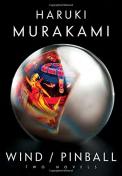
by Haruki Murakami
Hardcover- $17.14
In the spring of 1978, a young Haruki Murakami sat down at his kitchen table and began to write. The result: two remarkable short ...
Overall rating:
How would you rate this book?
Member ratings
Wind/Pinball, Haruki Morakami, translator from Japanese, Ted Goossen, narrator is Kirby Heyborne
These are the first two novels/novellas written by the author, and they were supposedly penned as he sat at his kitchen table pondering the great effort it is to write one. Although separated by several years, the two novels are joined together. The first begins in August of 1970 and ends 18 days later in the same month. The nameless narrator of both, whom we shall call our friend from this point on, is a 21 year old college student whose feathers never seem to ruffle. He is calm and even tempered even as his friend is loud and overbearing. When the novella begins, our friend is in J’s bar sharing a rather raucous moment with his newly acquired good pal, Rat, a college dropout who resents his wealth but takes full advantage of it. They are both whiling away the time of their summer respite. Rat and our friend leave the bar in an inebriated state and are involved in a car accident which causes damages to a park and upsets some monkeys. When the car is totaled, Rat doesn’t mind because he will simply purchase another. However, both men are saddled with the burden of paying for damages sustained by the park, for the next three years, so there are consequences. Both of the young men are aspiring authors and when the second novella ends, in 1978 with the quote “How can those who live in the light of day possibly comprehend the depths of night”, our friend is 29, married and seems content, and both he and Rat are still writing. Rat’s novels have always remained free of any references to sex or death, and both subjects are still absent in his latest works. He dedicates his books to his nameless friend with a cryptic message which our friend understands, but would be meaningless to others.
Our friend is even-tempered as he encounters and interacts with an odd assortment of characters that flit in and out of the narrative, through a revolving door which is often one way and does not return them. Only a few are recurrent and then only barely. Nothing of major import seems to ever get resolved. It is as if there is little meaning, in the end, to their lives or their interactions. Our friend has a mentor, Derek Hartfield, an author who jumped to his death from The Empire State Building, holding an umbrella in one hand and a picture of Adolph Hitler in the other. It is an unusual choice of mentor and an unusual image for the reader which foreshadows the rather inane narrative of both novellas.
In conversations between Rat and our friend, Rat talks about his fear of death. If everyone dies, eventually, he seems to feel that everything, in its own way, is futile, perhaps purposeless. Since most do not leave a permanent mark and do disappear from view, vanish not only from sight but from the memory of others, might we not all ask, “what then, is our ultimate purpose”?
Our friend, remains true to character, stays fairly quiet and neutral, emotionally, throughout both novellas, simply listening to his friends and acquaintances while neither condemning nor judging them. We learn that our friend has a brother, and both of them routinely are required to shine their father’s shoes out of respect for him, and yet, at certain times, he casually dismisses his obligation. True to form, nothing has major import as characters meander in and out of the narrative. Our friend tells about many of the unusual characters he meets. One is a young woman who has a twin. She has only 9 fingers, and that meaningless, missing body part is the only distinguishing feature that separates her from her sister. He speaks of a one time girlfriend who took her own life. Another friend died from alcohol poisoning. There is a teenage girl who speaks of being confined to a bed for the last three years, hoping for a cure for her debilitating neurological disease. Then there is the uncle who survives the war only to ironically die, after it ends, when he steps on a landmine he himself had planted. We are privy to a conversation on the radio. The MC calls our friend and informs him that a young lady wanted them to play a song for him. He remembers that he once borrowed that record from this girl, lost it and thus never returned it. He sets about trying to return a new copy to her, but even after a broad search, he is unsuccessful. This is another unfruitful moment.
There are a series of conversations which bounce around and essentially go nowhere. Profound subjects are introduced but they are all, in the end, treated in a mundane manner. Subjects like life and death, truth and deception, trust and love are introduced but barely developed. Nothing is explored very deeply. Both novellas skirt around on the surface of life and sometimes I wondered if I was missing the author’s meaning, and then I wondered if there actually was a meaning other than the ultimate meaninglessness of everything we do, especially if we have no way to leave a permanent mark.
The reader, Kirby Heyborne, reads the novellas in a deadpan voice which perfectly conveys the author’s meaning and intent, but I am afraid, much of it may have been lost on me.
Book Club HQ to over 90,000+ book clubs and ready to welcome yours.
Get free weekly updates on top club picks, book giveaways, author events and more








